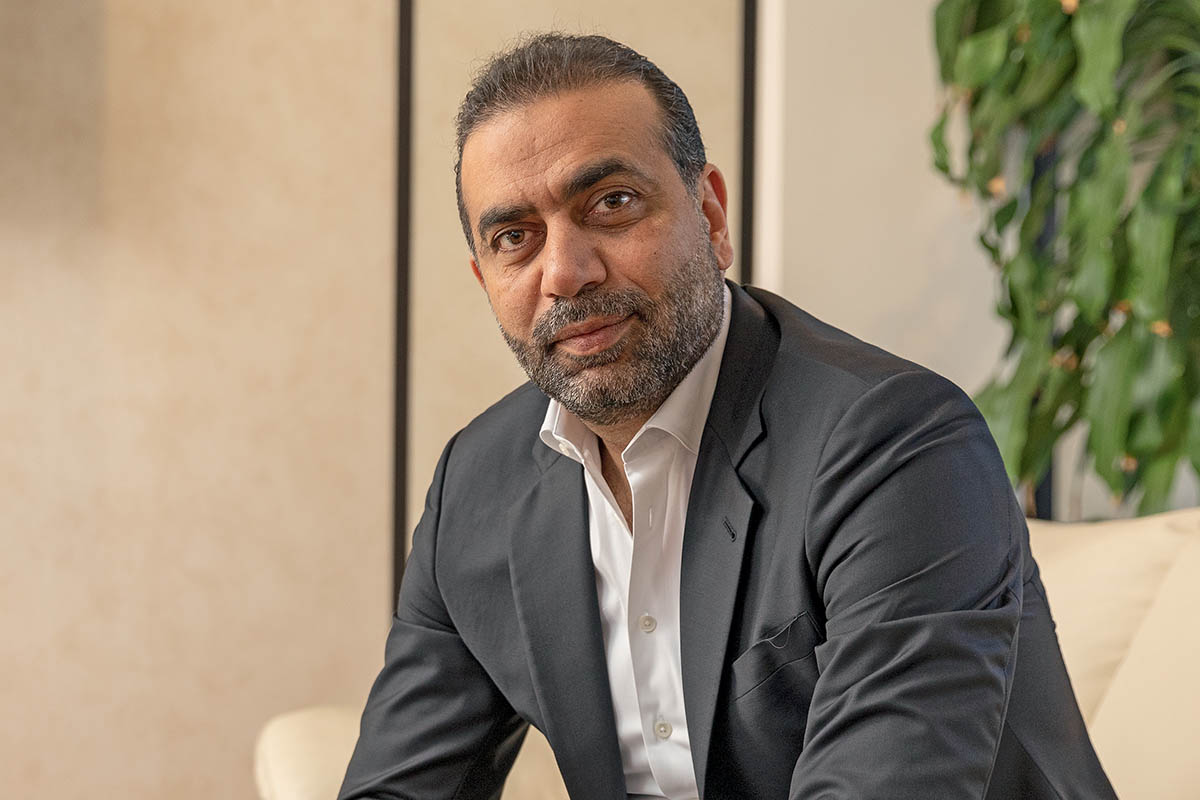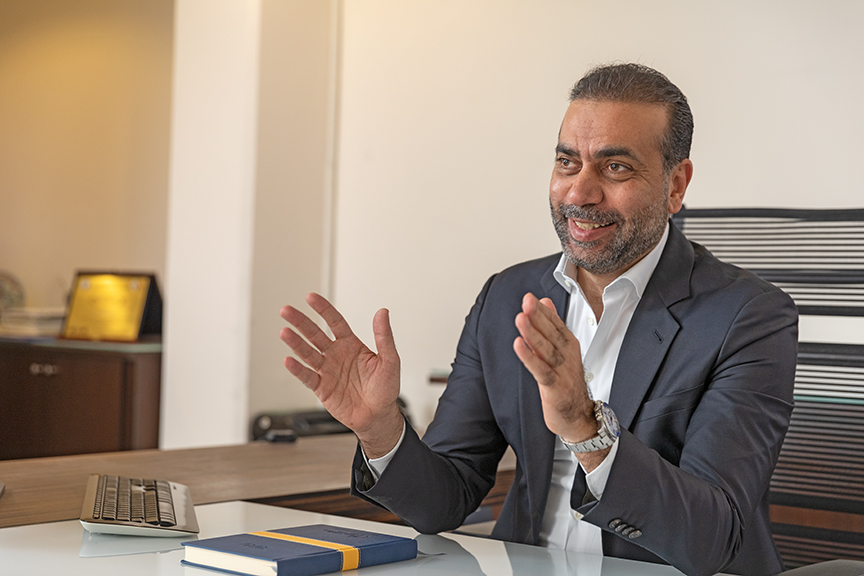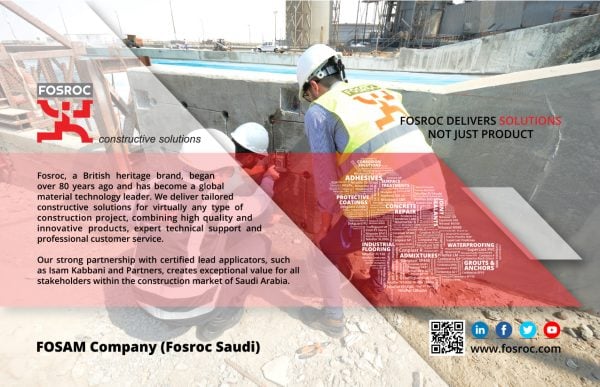When he completed his civil engineering degree at Cairo University, Hatem Salaheldin found himself at a fork in the road. He could either join his family’s medical equipment business, or he could take the natural next step from his university training to enter the construction industry.

Although it would be years before the Middle East would enter its current oil-and-gas-fuelled infrastructure boom, he decided to give construction a chance. Hatem’s first role in the industry would vindicate that choice.
He took a job at the Saudi-based Kabbani Construction Group (KCG) – at the time a rising regional player in specialised contracting – where he was assigned to a project that included the construction of Egypt’s first hyperbaric treatment.
The biomedical knowledge he gained from his upbringing complemented his engineering training and helped ensure the project’s success. After seeing it through to completion, he knew he was meant to be a builder.
Today, as CEO of KCG, Hatem oversees a sprawling operation that includes 17 companies that provide services in waterproofing, concrete repair and maintenance, oil field services, electromechanical, fit-out, industrial insulation, and roads and airfield construction in seven countries.
“Solving construction problems through innovations in engineering is the most enjoyable and meaningful part of my work,” he says. “I embrace new ideas with passion, transforming them through scientific processes into solutions that my entire team is involved in implementing. It is the great results achieved from this process that I enjoy most.”
Although much of the Middle East’s construction boom over the past several years has been made possible by the high prices paid for oil and gas by countries across the world, there is an understanding in the region that those resources are finite.
We are now developing other forms of sustainable energy solutions such as wind, tide and waves, which our region is extremely rich in.
At KCG, Hatem is leading efforts to incorporate renewable energy solutions into the group’s projects. One company in the group, IK Energy, offers solar panels and other renewable energy solutions that can provide clients with up to 22 gigawatts per hour of clean electricity every year, which would save them an estimated US$8 million (€7.06 million) per year for the next 25 years.
“This is one of our fastest-growing companies, and we are now developing other forms of sustainable energy solutions such as wind, tide and waves, which our region is extremely rich in,” he says.
Another key innovation Hatem is championing is Building Information Modelling (BIM), a digital process that allows KCG to digitalise its construction methods and complete projects more quickly, accurately and sustainably.
“BIM is being applied to almost everything we do today. Although we may be behind some of the construction players in northern Europe and Singapore, we are definitely carving the way with this technology in our own market,” he says.
It is my aim to seize the momentum of this dynamic change and help the Kingdom to become a vibrant hub for international-grade expertise.
As infrastructure development across the Middle East improves, an increasing number of KCG’s clients are acquiring the software and skills necessary to view and manipulate BIM technology. However, for those who are still catching up, Hatem and his team are still able to solve potential problems in the design phase so that complications do not arise during construction.
BIM has been such a boon to KCG’s business that the group even set up a consultancy service in which digital live models are used to simulate an array of hazards a building might face during its service life, allowing preventions to be implemented well in advance.
Revolution in construction
In Hatem’s view, BIM is an integral part of a larger trend that is changing the face of the construction industry. “Industrialisation of construction will lead a new revolution in the industry,” he states.

This revolution is characterised by practices that originated in manufacturing making their way into construction, such as prefabricated prefinished volumetric construction (PPVC), design for ease of manufacturing and design for ease of assembly and has been made all the more crucial by the impact of COVID-19.
“The pandemic is a game-changer for the construction sector in the short and long-term. Companies who ignore digitalisation, modelling, industrialisation and decentralisation will struggle to survive,” Hatem says.
“We all saw how China was able to build a 60,000-square-metre hospital in 10 days, which was only possible through PPVC and is what construction companies in the Middle East should be geared up to.”
KCG has begun to move in this direction, starting with BIM training for management-level engineers and even technicians with Hatem explaining that digital modelling is the foundation of industrialisation in construction.
“If you know how to build your digital building model down to the finest details, you can easily send it for manufacturing and then plan its assembly on site and, finally, build it in no time,” he says.
By striving to perfect these innovations, Hatem hopes to position KCG to play a central role in Saudi Vision 2030 – an ambitious strategy to reduce Saudi Arabia’s dependence on oil, diversify its economy and develop public service sectors such as health, education, infrastructure, recreation and tourism.
“Our region in general and Saudi Arabia in particular are full of beautiful virgin beaches, colourful coral reefs, rich marine life and bright, sunny weather almost all year long – a paradise on earth. The Kingdom’s Vision 2030 is utilising these untapped coastlines to create the perfect combination of a smart and sustainable place to work and live with a high quality of life and extraordinary resorts. It is my aim to seize the momentum of this dynamic change and help the Kingdom to become a vibrant hub for internationalgrade expertise,” he says.
“As the country continues to establish itself as an emerging major global player, it will be challenging to preserve and strengthen our unique identity amid the influx of global ideas and standards.
“It’s a challenge I relish as it’s a huge source of pride to me that KCG is testament to the fact that all the knowledge and skills we need to deliver this incredible region into the future can already be found right here at home.”
Proudly supported by:



